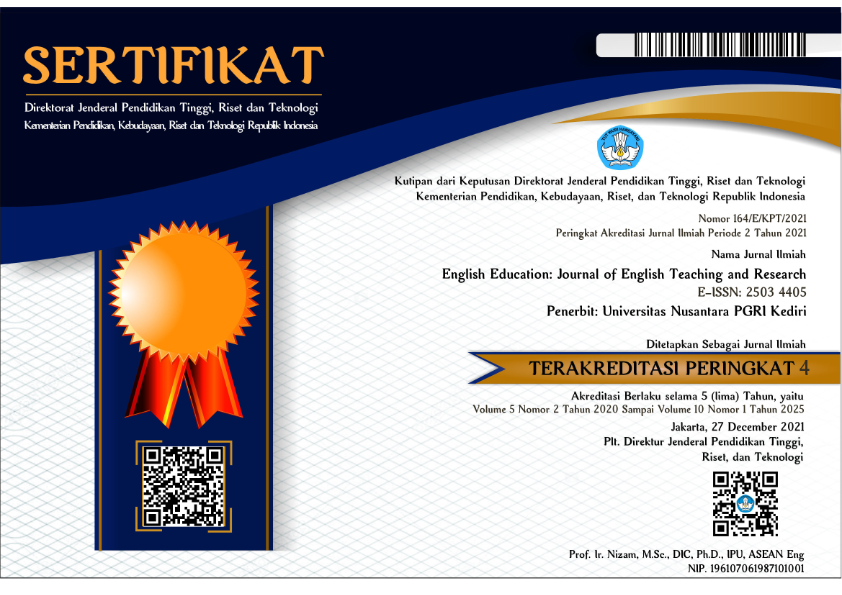Students’ Responses to Teacher’s Corrective Feedback in Foreign Language Writing: A Case for Nursing Students at STIKES Baptist Hospital Kediri
DOI:
https://doi.org/10.29407/jetar.v4i2.13713Abstract
Abstract
The aim of this study was to describe the students’ response to teacher’s corrective feedback in foreign language writing: a case for nursing students at STIKES Baptist Hospital Kediri. This research used descriptive qualitative approach as its design. The subject was 24 students of second semester of Diploma III. Documentation and interview used for collecting data aboutthe teacher’s corrective feedback, questionnaire used for collecting data about students’ response in terms of attitude to teacher’scorrective feedback, questionnaire and documentation used for collecting data about students’ response in terms of action. The data analysis was based on three concurrent flows of activities.They were: data reduction, data display, and conclusion.The result of this study showed that the teacher gave direct corrective feedback in students’ foreign language writing by circling the students’ errors and providing the correct answer. The teacher’s gave direct corrective feedback on the students’ error in grammar, spelling, punctuation, capitalization, preposition, article and content.The students have positive responses towards the teacher’s corrective feedback by remembering their grammar mistakes. It is supported by the data from questionnaire for students’ attitude that showed most of students agreed that the teacher should point out grammar errors. Most of the students believe that correction on their writing task is useful.Most of students say that they feel more motivated to go on learning when the teacher corrects their error in writing. They also showed positive response when most of the students answered that they will revise their writing if their errors are corrected by the teacher and choose for direct corrective feedback. From the research findings, it can be concluded that most of the students have positive attitude to teacher’s corrective feedback.
Downloads
Downloads
Published
Issue
Section
License
Authors who publish with this journal agree to the following terms:
- Copyright on any article is retained by the author(s).
- The author grants the journal, the right of first publication with the work simultaneously licensed under a Creative Commons Attribution License that allows others to share the work with an acknowledgment of the work’s authorship and initial publication in this journal.
- Authors are able to enter into separate, additional contractual arrangements for the non-exclusive distribution of the journal’s published version of the work (e.g., post it to an institutional repository or publish it in a book), with an acknowledgment of its initial publication in this journal.
- Authors are permitted and encouraged to post their work online (e.g., in institutional repositories or on their website) prior to and during the submission process, as it can lead to productive exchanges, as well as earlier and greater citation of published work.
- The article and any associated published material is distributed under the Creative Commons Attribution-ShareAlike 4.0 International License








 Article template
Article template



